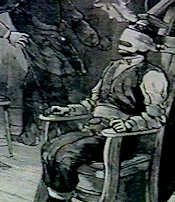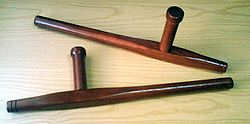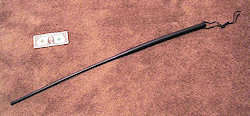Aug
24
Sparky Stays Home
 Posted by Clif Burns at 7:05 pm on August 24, 2009
Posted by Clif Burns at 7:05 pm on August 24, 2009
 Category: BIS
Category: BIS
 Last week the Bureau of Industry and Security (“BIS”) proposed changes in the Commerce Control List to impose new export controls on devices designed for human execution, certain restraint devices, law enforcement striking devices, and certain torture devices that weren’t previously controlled. Although these new controls are laudably motivated by human rights concerns, they seem to be oblivious to the notion that the devices subject to these new controls are readily available abroad and that these controls will not have any impact on humans rights abuses by rogue states intent on doing bad things to their citizens or others who fall into their hands. Instead, the only real effect will be to impose additional regulatory burdens, in some cases, on U.S. exporters who are trying to determine whether items are now covered by the new and amended export controls.
Last week the Bureau of Industry and Security (“BIS”) proposed changes in the Commerce Control List to impose new export controls on devices designed for human execution, certain restraint devices, law enforcement striking devices, and certain torture devices that weren’t previously controlled. Although these new controls are laudably motivated by human rights concerns, they seem to be oblivious to the notion that the devices subject to these new controls are readily available abroad and that these controls will not have any impact on humans rights abuses by rogue states intent on doing bad things to their citizens or others who fall into their hands. Instead, the only real effect will be to impose additional regulatory burdens, in some cases, on U.S. exporters who are trying to determine whether items are now covered by the new and amended export controls.
One of the more perplexing, and arguably only symbolic, new ECCNs would cover equipment designed for the execution of human beings. Presumably this covers equipment which is only used to execute human beings, so shipments of swords to the Saudis, who regularly use them as execution devices, is still a-okay. Exporting stones to Afghanistan and Pakistan wouldn’t be a problem, although I suspect that each country has an ample supply of stones and little need to import them. No problems with ropes, either, unless, of course, the noose is pretied.
But this raises another question. Is anyone in the United States making (and exporting) electric chairs, guillotines, gas chambers, lethal injection machines and gallows? I have to say I’d be somewhat surprised if that were the case and I suspect that countries that still use execution devices of this sort build the devices themselves with locally-available parts.
Finally, the proposed execution device ECCN includes a little slap in the face of our friends to the north, noting that a license is required for execution devices to all countries “including Canada.” Canada last executed a criminal in 1962, outlawed capital punishment in 1976, and refuses extradition unless the extraditing country provides assurances that the defendant will not be subject to the death penalty.
ECCN 0A978 which currently requires a license to export saps would be expanded to law enforcement striking devices. (No jokes, please, about exports of saps in the more commonly-understood sense). The list of illustrative devices also would be increased from saps to such exotica as tonfas,

sjamboks,

and whips.

Unless a whip is a tool of the trade under the BAG exception, Indiana Jones is so screwed.
 Permalink
Permalink
Copyright © 2009 Clif Burns. All Rights Reserved.
(No republication, syndication or use permitted without my consent.)
9 Comments:

Thankfully, pine boards, towels and water will remain EAR99. Of course, even if controlled, under some circumstances they might qualify under license exception GOV.

Ironic, isn’t it, that the U.S. chooses to restrict the the export of execution devices when it is one of the minority of countries still practicing the death penalty. Maybe it’s another of those of those Short Supply reasons for control.

Heavy water is controlled under 0C004, though I doubt that’s not the kind of water Mark is referring to.

Sorry. I didn’t mean to say “I doubt that’s not the kind…” But rather, “I doubt that’s the kind of water Mark is referring to.”

In its infinite wisdom, BIS forgot to include “parts and accessories, n.e.s.†or “specially designed components therefor” in the language of 0A981. But then again, maybe this was by design as a “stimulus package”. Those makers of OEM execution device parts need help just like any other industry.

Were these devices limited to those typically used on Humans or for example, would a cartridge powered captive bolt instrument be covered? Or any such device more typically applied to animals?

“they seem to be oblivious to the notion that the devices subject to these new controls are readily available abroad and that these controls will not have any impact on humans rights abuses by rogue states intent on doing bad things to their citizens or others who fall into their hands.”
Isn’t this argument a bit absurd – if you took it seriously, wouldn’t it imply removing any system of nationally-imposed export controls? Military weapons are readily available abroad – does this mean we should get rid of the whole of ITAR?
It seems to me the new CCL controls, for the most part, would cover specially-designed goods which *are* routinely exported from the US. The submissions to the BIS on the proposed rule change are interesting in this regard – at http://www.regulations.gov/search/Regs/home.html#docketDetail?R=BIS-2008-0005
For instance, according to the submission from Amnesty International USA, there has indeed been a commercial manufacturer of death penalty equipment in the US – they claim that “A Boston company, Fred A. Leuchter Associates Inc, claimed credibly to have supplied lethal injection execution systems to several US states on a commercial basis until its dissolution in October 1998”

Isn’t this argument a bit absurd – if you took it seriously, wouldn’t it imply removing any system of nationally-imposed export controls? Military weapons are readily available abroad – does this mean we should get rid of the whole of ITAR?
No, because not everything on the ITAR is readily available abroad. For things on the list that are readily available, there are a number of people, myself included and probably many other readers here, who question whether they should remain on the list.
The Leuchter info is interesting. I’ll run that down, although it appears to deal with a company that didn’t export the devices and has been defunct for more than a decade. Again, though, if anyone has evidence of current exporters of this stuff, it would certainly strengthen BIS’s case for these controls, particularly if this was something a foreign government might have a hard time building on its own.

I also like this caveat that was thrown into the amendment of 742.7 (under crime control in ‘control policy’):
(d) U.S. controls. In maintaining its
controls on crime control and detection
items, the United States considers
international norms regarding human
rights and the practices of other
countries that control exports to
promote the observance of human
rights. However, these controls are not
based on the decisions of any
multinational export control regime and
may differ from controls imposed by
other countries.
International norms… like what? The Geneva Convention? Yeah, okay, we’ll *consider* it..
 Last week the Bureau of Industry and Security (“BIS”) proposed changes in the Commerce Control List to impose new export controls on devices designed for human execution, certain restraint devices, law enforcement striking devices, and certain torture devices that weren’t previously controlled. Although these new controls are laudably motivated by human rights concerns, they seem to be oblivious to the notion that the devices subject to these new controls are readily available abroad and that these controls will not have any impact on humans rights abuses by rogue states intent on doing bad things to their citizens or others who fall into their hands. Instead, the only real effect will be to impose additional regulatory burdens, in some cases, on U.S. exporters who are trying to determine whether items are now covered by the new and amended export controls.
Last week the Bureau of Industry and Security (“BIS”) proposed changes in the Commerce Control List to impose new export controls on devices designed for human execution, certain restraint devices, law enforcement striking devices, and certain torture devices that weren’t previously controlled. Although these new controls are laudably motivated by human rights concerns, they seem to be oblivious to the notion that the devices subject to these new controls are readily available abroad and that these controls will not have any impact on humans rights abuses by rogue states intent on doing bad things to their citizens or others who fall into their hands. Instead, the only real effect will be to impose additional regulatory burdens, in some cases, on U.S. exporters who are trying to determine whether items are now covered by the new and amended export controls.


 Permalink
Permalink

 Posted by
Posted by  Category:
Category: 

